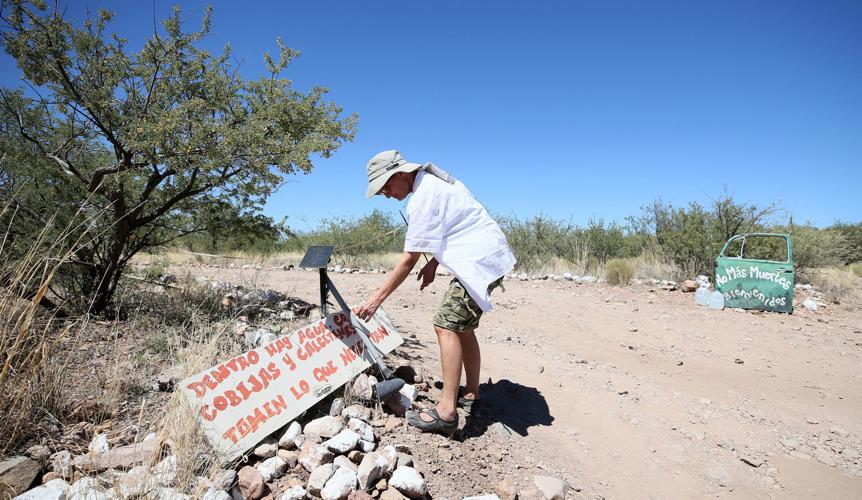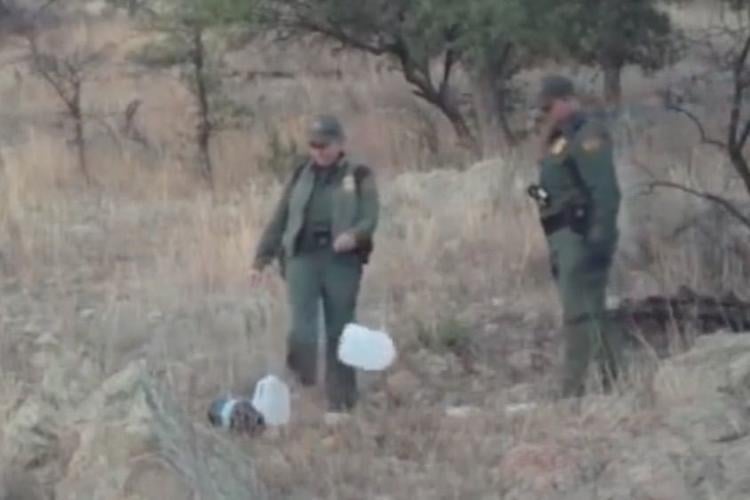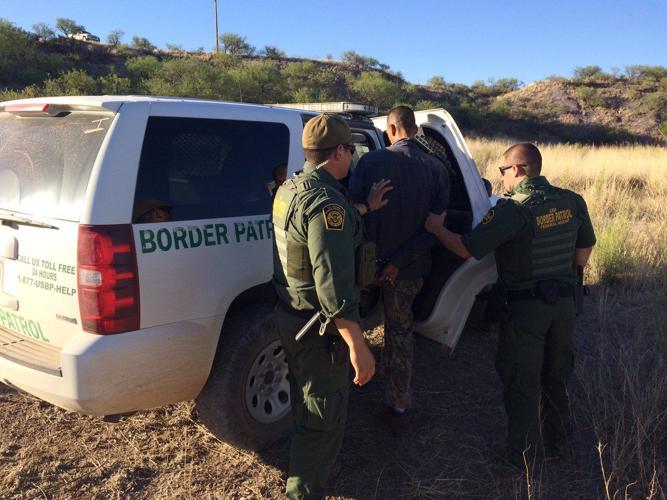New details are emerging on the January arrest of a border-aid worker in Ajo on human-smuggling charges and the legal arguments surrounding the arrest, one of the first in more than a decade.
Border Patrol agents arrested Scott Warren, a 35-year-old volunteer with Tucson-based No More Deaths, at a humanitarian-aid station in Ajo on Jan. 17. Agents also arrested two Central American men and alleged Warren was smuggling them into the United States. Warren was indicted in February by a federal grand jury on two counts of harboring and one count of human-smuggling conspiracy.
Warren is the only border-aid worker in Southern Arizona known to have been arrested on human-smuggling charges since 2005.
In a rare glimpse inside Border Patrol operations, recent federal court documents show agents narrating via text messages the events leading up to the arrests. A search warrant request filed five days after the arrests provides a more formal version of events.
Court documents also show defense lawyers and federal prosecutors hashing out the legality of the search of the property in Ajo, known as the Barn, and whether Warren’s religious beliefs protect him from prosecution.
‘Get ready to roll’
The text messages were included in documents filed April 19 that subsequently were removed from online federal court records. They are available alongside the online version of this story at tucson.com
The text messages were sent by seven agents, but most of the texts were sent by three agents. One agent used an avatar that apparently promotes waterboarding. The nickname of another agent references the Rambo action movies.
The messages were sent as agents gathered forces on Jan. 17 after setting up surveillance of the Barn.
“We’d like to get guys in position to get up and knock it fast before they can bolt,” an agent texted.
“Toncs at the barn,” the agent texted, followed by “get ready to roll this way all who are available.”
The term “tonc” is widely used by agents to refer to border crossers, but the origin of the term is unclear. One theory says the term, also spelled “tonk,” comes from the sound of a flashlight hitting someone’s head. Other theories say it is an acronym for “temporarily outside naturalized country” or “true origin not known.”
“Scott Warren pointing out terrain to them,” the agent continued. “Probably the two from Ajo yesterday.”
The agent asked for arriving agents to be briefed on “covering all sides of the property as quickly as they can.”
As they coordinated with sheriff’s deputies, the agent said, “We’re going to take everyone in regardless.”
“Everyone be as professional as possible,” another agent texted. An agent responded “Of course. You know us.”
An agent said when everyone was ready he and another agent would “jump in with the lead vehicle.”
An agent directed another agent to “just run it by your side regarding prosecution for these guys” and “for 1324 harboring and conspiracy for the uscs,” in reference to the federal human smuggling statute and U.S. citizens.
“I believe Nogales has an investigation on the organization,” another agent texted.
An agent texted “make sure those toncs are isolated so we can get good mat wit interviews.” Court records show border-crossers, including those arrested Jan. 17, often are interviewed as material witnesses against smugglers.
Search warrant
The day before the arrests, agents arrested a border-crosser near a church in Ajo. The man told agents he had been traveling with two other Central American men, who said they were going to be picked up in Ajo by an unknown person, Agent Mary Ann Fogal wrote in a Jan. 22 search warrant request.
Around 2 p.m. the next day, agents set up surveillance near the Barn, which the property owner allowed No More Deaths to use to “facilitate supply drops for illegal aliens in the desert,” such as food and water, Fogal wrote.
Around 3:30 p.m., agents saw Warren’s black Nissan Xterra arrive and watched Warren walk into the Barn. An hour later, Warren and two men walked out of the Barn. Warren pointed out mountains and landmarks. They then walked back inside.
At 5:30 p.m., agents approached the Barn and spoke with Warren in the driveway. They told Warren they were investigating illegal border-crossing activity at the Barn. Warren said the Barn was used for humanitarian aid. He declined to answer questions and asked the agents to leave.
Agents then told Warren they intended to approach the Barn and speak with the owner. Warren said he would go with them, Fogal wrote.
During that time, other agents were moving to another side of the Barn to “provide perimeter security.” They saw a man running inside the building. They also saw the outside door to an add-on room close quickly, Fogal wrote.
An agent knocked on the door of the add-on room and said he was a Border Patrol agent. A man opened the door and the agent told him to show his hands and sit down. Agents determined he was Kristian Perez Villanueva, a citizen of El Salvador who was in the country illegally.
Agents found the other man in the shower of the add-on room. Agents determined he was Jose Sacaria Godoy, a citizen of Honduras who was in the country illegally.
After their arrests, Perez and Sacaria said they crossed the border on Jan. 14 with three other men, one of whom said he knew someone in Ajo who could help them and corresponded via text message with the person during the trek.
The three other men eventually decided to return to Mexico. Perez and Sacaria were picked up in a white van and taken to the Barn, where they stayed for a few days. Warren gave them food, water and a bed. He also cooked for them, Fogal wrote.
Just before they were arrested, Warren told them where to walk north and said he would give them water, food and clean clothes, Fogal wrote.
Five days after the arrests, agents executed the search warrant and found two hand-drawn maps that identified Border Patrol checkpoints to the north and south of Ajo, along with signs in English and Spanish posted in a common area telling occupants how to respond if immigration authorities came to the Barn.
Knock and talk
The text messages show the agents intended to arrest the occupants of the Barn, which means the subsequent search was illegal, pro bono defense lawyers Gregory Kuykendall and Amy Knight wrote in a motion to suppress evidence gathered during the arrests.
The Barn is located on a 5-acre lot encircled by a barbed-wire fence. A dirt driveway leading to a gate is the only entrance to the property, they wrote.
Agents said they performed a “knock and talk,” in which an agent knocks on a door as any private citizen would do to talk with the owner of the property, without needing a search warrant.
But Kuykendall and Knight said the knock-and-talk exception does not apply because the “convoy of at least five vehicles” of law enforcement that encircled the Barn, as well as agents searching the property after being asked to leave, “vastly exceeded any implied license” to enter the Barn or the area around it.
In a response filed Thursday, federal prosecutors Nathaniel Walters and Anna Wright said two agents spoke with Warren in the driveway. As one agent spoke with Warren, the other agent walked to the Barn. He saw a man inside running, which gave the agents probable cause to search.
They said Warren had no expectation of privacy because he did not own or live in the Barn, which also means he cannot legally challenge the search.
Prosecutors said the agents’ actions show their intent was to question the occupants of the Barn and make arrests only if they developed probable cause.
In addition, agents are allowed to conduct a protective sweep if they believe an occupant could pose a danger to them.
Religious freedom
Kuykendall and Knight also asked Chief Judge Raner C. Collins to dismiss the two harboring charges. They did not address the conspiracy charge.
They said Warren is protected from prosecution because his actions were based on a sincerely-held religious belief that he must help people in the deadly border region where hundreds of bodies were found in the last few years.
The lawyers cited religious texts, such as biblical passages that say “whoever has two coats must share with anyone who has none; and whoever has food must do likewise.”
They described the Barn as the “home base” for humanitarian operations in Ajo by aid groups such as No More Deaths, which is a ministry of the Unitarian Universalist Church of Tucson.
Perez and Sacaria said they were chased by Border Patrol agents and dropped their food and water as they ran, Kuykendall and Knight wrote. They were hungry and tired and let themselves into the bathroom of the Barn, which was vacant when they arrived.
Warren saw them about 40 minutes later. He let them stay and eat and drink. He never instructed them to hide or to remain inside, they wrote. Warren never offered them a ride or took them anywhere, nor did he give them maps, flashlights or backpacks, the defense lawyers wrote.
In response, prosecutors Wright and Walters said Perez and Sacaria testified they bought burritos and sports drinks at a gas station in Ajo with money given to them by a stranger.
Perez and Sacaria were not “dehydrated, hypothermic, or famished at any point during their trip, let alone when they arrived at the Barn and were taken in by the defendant,” the prosecutors wrote.
If the two men had in fact been in distress, the higher priority should be to help them seek medical care in a clinical setting, rather than avoid agents, they wrote.
They also said Warren “is not required by his beliefs to aid in the evasion of law enforcement.”
Warren’s actions were part of his participation with “self-described humanitarian groups” in Southern Arizona that “help aliens illegally enter the United States” and “the Barn was an integral part of their mission.”
As a result, they wrote, there is a risk Warren will continue to help border-crossers avoid law enforcement and reach the interior of the United States.
Previous encounters
A No More Deaths spokeswoman said the text messages show the Border Patrol is targeting humanitarian-aid workers.
“Attacks on life-preserving humanitarian aid in the borderlands are part of the anti-immigrant, white supremacist agenda of the Trump administration,” volunteer Alicia Dinsmore said in a statement.
The January arrests came hours after No More Deaths released a report alleging agents had destroyed thousands of water jugs left for border crossers.
In a separate case, Warren and eight other aid workers face federal misdemeanor charges for driving in a Southern Arizona wilderness area last year, leaving water bottles and food.
In June 2017, Border Patrol agents arrested four border-crossers at the No More Deaths camp near Arivaca. Agents said they followed footprints to the camp. A federal judge issued a search warrant allowing them to enter the property.
The last known arrest of aid workers in Southern Arizona on human-smuggling charges was in July 2005, when two No More Deaths volunteers were arrested near Arivaca while driving three border-crossers to a medical clinic at a Tucson church. A federal grand jury indicted them on charges of transporting border-crossers and human-smuggling conspiracy.
Collins, the chief federal judge in Tucson who is presiding over Warren’s case, dismissed the charges in September 2006. He said the volunteers were following protocol they were told was approved by the Border Patrol, court records show.
But Collins said if aid workers transport border-crossers in the future they could be charged “at the least, with reckless disregard for the law.”








